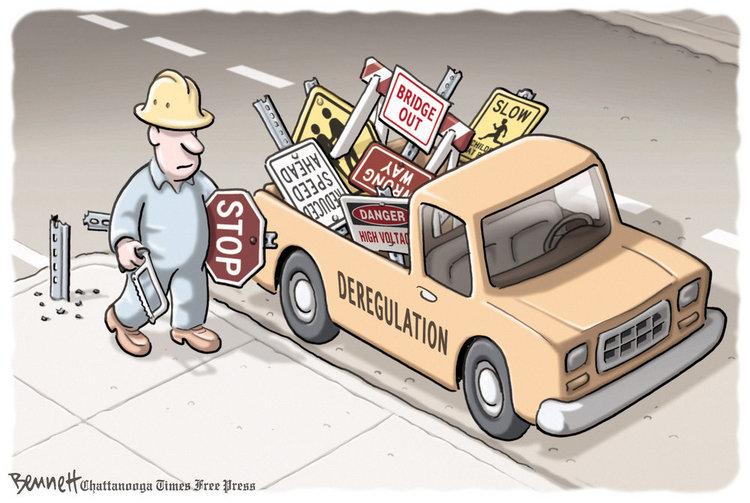I find this comic extremely ironic. It compares deregulation to someone removing traffic signs. When you look at it, your reaction is probably “OMG, deregulation is bad!”. Anarchy and chaos would result! Injury, death, and mayhem in the streets!
The irony is that an increasing number of cities in Europe are doing exactly that — removing all traffic signs. Some are even removing road markings. So far, the result has been that motorists are forced to become more careful, reducing accidents and other problems. Even more ironically, traffic congestion is often lowered.
I’m not against regulations, and I’m not against deregulation. I’m for regulations that make sense, and against regulations that don’t work.
A case in point is the city where I live. A few years back, the city rewrote the health laws that apply to restaurants, removing outdated regulations (that didn’t make sense any more), and removing regulations that mainly served to reduce competition, such as simplifying regulations on small and unconventional restaurants like food stands at farmer’s markets and food carts. At the same time, they made it easier to enforce the regulations that do protect the health of the restaurant-going public.
As a result, the food scene went from boring to bountiful. A major travel magazine rated us one of the top places in the world for street food. Food at conventional sit-down restaurants has gotten much better as well. Why? When regulations make it more expensive to start and operate a restaurant, you tend to be much more cautious and serve foods you know will sell. But with a lower barrier to entry, you can try more adventurous menus. Some of these innovative restaurants will fail because their food doesn’t catch on. But at least they will fail quickly and waste less money failing, so their owners can try again. In just a few short years, we went from a monotonous food scene to one where I can get just about any kind of crazy delicious food from anywhere in the world. That’s deregulation that makes sense!



7 Comments
I agree IK. Capitalism at its finest, try an idea and if it works then great if not then try again.
On the signs depicted in the cartoon, the first (and most wasteful IMO) are the credit signs. By that I mean a road or bridge repair project, that along with caution signs, has to have a “this project funded by the recovery and re-investment act” and then one for the Governor with his name. Every roads project in my state, including a sidewalk repair that I saw, has at least one of those 4′ x 5′ signs on each side of the road. Now i understand that somebody was employed to make those signs and they look swell, but really.
I emphatically believe in providing regulation to keep patrons safe by enforcing safe conditions and work practices in restaurants and other similar industries, but I also believe in reducing any truly unnecessary and wasteful regulations and paperwork requirements. I mentioned before that my wife does family childcare and the regulations she has to put up with are increasing every year. In the last 5 years she mow has to have daily sign in sheets for each child, she must also document what and how often she feeds each child and so on. I just waiting for them to require her to document diaper changes. When they do I think we should mail them to the State Childcare offices.
You live in Portland? Me too! Awesome! When you were describing this Portland was the only place that came to mind, and I checked on the link and I was right!
Where else but Portland?
Also we should always distinguish between regulations at Federal, State, City level etc. Some make sense at Federal level some don’t.
I do hate to be a nay-sayer, but the analogy of the citizens in a European city and American corporations isn’t quite right. And sure easing restrictive regulation on smaller businesses without jeopardizing customer safety is okay. Keep in mind that regulations are basically to keep in line unscrupulous business practices that affect that specific business less than those the business serves (or maybe that is an outdated term today). Do I dare to suggest one take any Asian industry or Wall Street or any large corporation, American or not, as examples? And, oh, yes, about your Portland small restauranteurs: let’s address this again in ten or twenty years when the real “entrepreneurs” have caught on to an opportunity to make a buck and jump ship before anything hits the fan. And also let’s address the European cities in a few years to see how the aggressive and timid drivers have fared, before we try that in New York or Boston or Los Angeles or even Portland.
Jim, the removal of traffic signs is happening exactly as it should — it is being tried in a small number of places to see how it works out. So far, reasonably
goodwell, but it is being watched closely. I don’t think anyone is suggesting we try it in a major city, at least not yet.And so far, our city health department is enforcing health regulations against street vendors, so I’m not sure what you are talking about with “making a buck and jump ship before anything hits the fan”. So far, it is working very well. And most street vendors have an incentive to keep it that way, lest street food get a bad reputation.
@IK, being a grammar nazi, you should know better. So far, reasonably well.